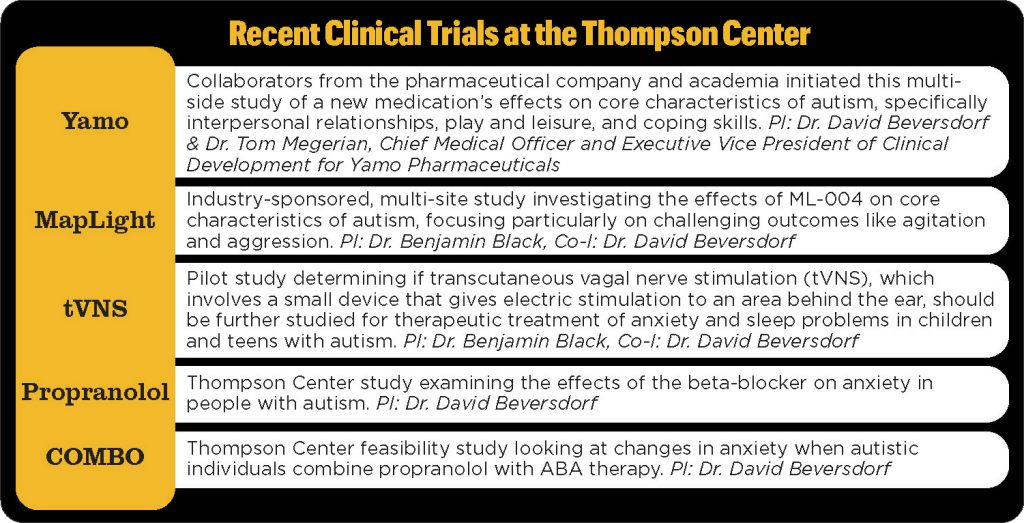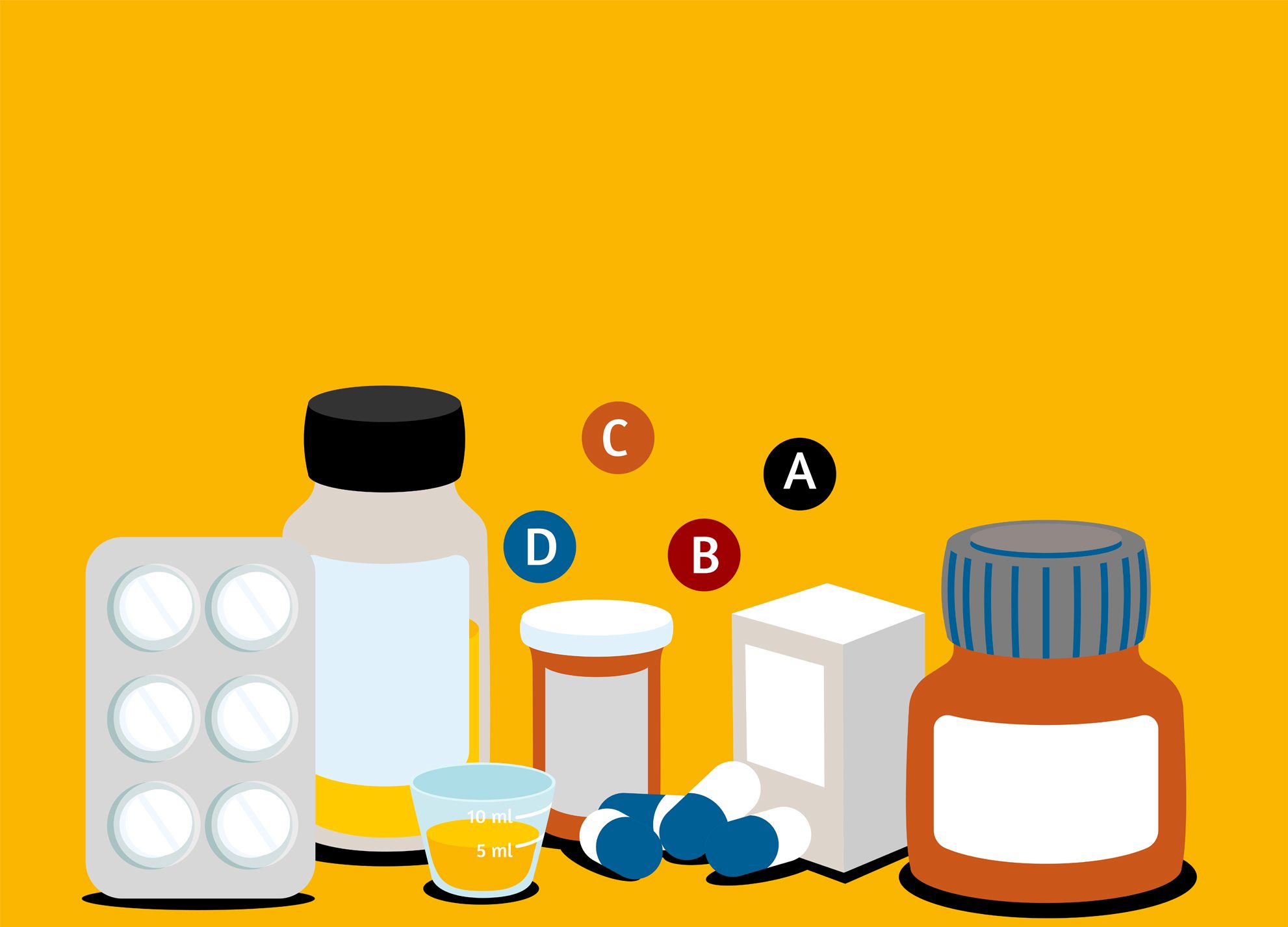Unveiling the Journey of Discovery: Clinical Trials at the Thompson Center
This story appears in the Fall 2023 issue of DISCOVERY, the Thompson Center’s research newsletter. Find more content like this on our DISCOVERY webpage.
At the Thompson Center, our dedicated research team is paving the way in understanding and addressing the complexities of autism. Among the many studies the team has been involved in over the last few years are several clinical trials. Samantha Hunter, the Thompson Center’s Clinical Trials Manager, simplifies the complexity of clinical trials: “A clinical trial is a study where researchers test the safety and effectiveness of interventions such as medications or devices on human health outcomes.” The essence of these studies lies in their potential to unveil new pathways in healthcare. “The different medications we use today in modern medicine were made possible through volunteers completing clinical trials,” said Hunter. Dr. Benjamin Black, Director of Medical Services and researcher at the Thompson Center, says that these volunteers, or research participants, are one of the hallmarks of working on clinical trials. “In clinical research, we think of our patients and families as partners with us, and we’re all investigating together to see if something really works.”

A Glimpse Into Recent Trials
Recent studies at the Thompson Center have focused on pivotal outcomes linked to social communication and anxiety, two significant domains impacting many autistic individuals. These trials aim to tackle challenges such as agitation, aggression, and the often medication-resistant nature of anxiety among this population. Dr. David Beversdorf, a Thompson Center researcher, welcomes this new approach. “Many studies look at conditions that exist alongside autism,” said Dr. Beversdorf, referring to past research projects that studied outcomes like sleep and gut health, “but these are some of the first we’ve done that focus on the core characteristics of autism.”
The table above summarizes five of the Thompson Center’s recent clinical research studies. These trials vary widely in their scopes and methodologies. For instance, the propranolol study engaged nearly 70 participants over a span of three years, while small COMBO and tVNS pilot studies focused on whether larger studies on these therapeutic agents should be conducted in the future. The industry-sponsored Yamo and MapLight trials have 10 or fewer participants enrolled through the Thompson Center, but are part of larger multi-site studies; the other projects are housed within the Thompson Center, thus giving our researchers more opportunities for input into the design of the study.
Challenges in Clinical Research
One challenge of recruiting participants for these studies is balancing eligibility criteria with existing treatments. For example, in the cases of the Thompson Center’s clinical trials where anxiety is a primary outcome being investigated, participants are ineligible if they are already taking antidepressants or SSRI medications. Families and individuals may also have reservations about trying new medications or therapies, which adds layers of intricacy to the recruitment process. New medications, like the one tested in the Yamo study, may be the first thing to come to mind for clinical trials. However, clinical trials are also used to investigate new uses of already established drugs. The medication tested in the MapLight study is a reformulation of a drug that is often prescribed for migraines. Propranolol is an inexpensive drug already used for test anxiety, migraines, and even for hemangiomas in infants. tVNS is not a medication at all and is believed to have less potential for side effects.
Clinical trails are also uniquely challenging because of the strict protocols they must follow. “Clinical trials are different from other types of studies as there is additional oversight provided by the FDA,” Hunter explains. “They often take many years to complete as there are different stages to go through to thoroughly test the safety and efficacy of an intervention.” Dr. Richard (Rick) J. Barohn, Executive Vice Chancellor for Health Affairs and Hugh E. and Sarah. D. Stephenson Dean of the MU School of Medicine emphasizes that these procedures central to the integrity of the research. “Upholding the highest ethical standards, they prioritize participant safety while facilitating collaboration among experts, industry, and academia.” To help University of Missouri researchers rise to this challenge. Dr. Barohn started the Clinical Research Study Coordinator Bootcamp. This program gives researchers and their support staff the foundational knowledge needed to successfully run clinical trials.
Clinical Research Study Coordinator Bootcamp
The Clinical Research Study Coordinator Bootcamp is designed to equip research coordinators and clinical research staff with essential foundational knowledge. This engaging two-day program, hosted at the Roy Blunt NextGen Precision Health building, offers a blend of interactive lectures and group exercises facilitated by seasoned Mizzou study coordinators and research support leaders. Each session is structured as a lecture-style presentation, focusing on research topics from the coordinator’s viewpoint, complemented by interactive elements like gamified activities and collaborative breakout sessions guided by subject matter experts in respective fields. To ensure comprehension and participation, participants undergo pre- and post-tests, integrated quizzes, and engagement check-ins for each presentation.

Partnering with Patients
Despite the challenges that accompany clinical research, the Thompson Center team shares an enthusiasm for these studies. Participating in clinical trials often gives patients and families access to therapies they may not have been able to try otherwise. Hunter recalls the impact of working on the propranolol study, “several individuals benefitted from taking propranolol during the open label extension and it was amazing to see the medication work for them.” The MapLight study has a similar open label extension where individuals are guaranteed to receive the active study medication to determine if it is a good fit for them. Building relationships with patients and families stands out as a favorite aspect for many involved. “Our patients tend to be really invested in the research, from a personal standpoint of getting benefits of a particular therapy, but many of them are invested because of the potential contributions to the greater good,” Dr. Black said. “Even if it doesn’t help their family immediately, the idea of being part of something that benefits other people down the road is really special.”
What’s Next?
As ongoing trials eagerly await results, Thompson Center researchers look forward to the next steps in their clinical explorations. Dr. Black aims to expand the study of tVNS to new sites, including the University of Cincinnati and Children’s Hospital of Orange County, pending approval of funding from the Department of Defense. Dr. Beversdorf’s hopes his research will address the broad range of autism characteristics by identifying subgroups within the autistic population. Perhaps identification of biomarkers unique to certain groups of people with autism will guide them to promising therapies that may not work for people on other areas of the spectrum. Meanwhile, the Thompson Center is still recruiting adults aged 18-45 with autism spectrum disorder for MapLight with the goal of eventually expanding the study to include teenage participants. As the journey continues, the Thompson Center’s researchers continue to display unwavering commitment to unraveling the complexities of autism to not only shape future interventions but foster a community of support for people with autism and their families.


